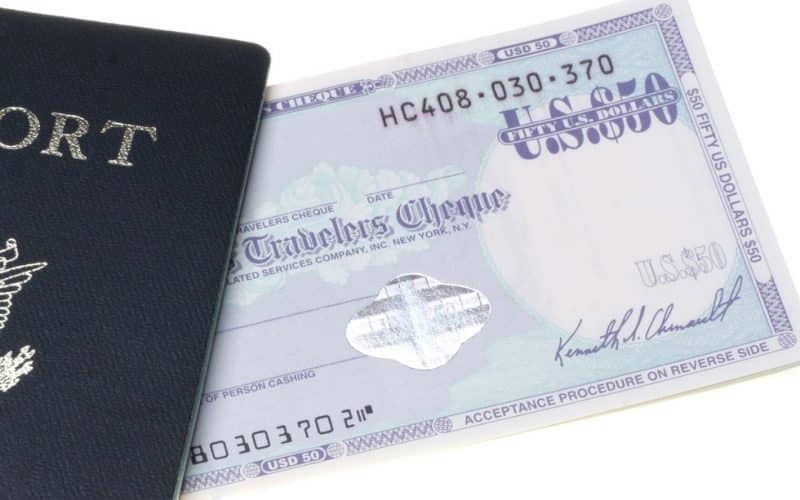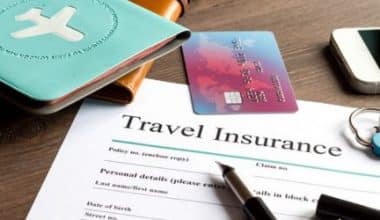Traveler’s checks, also known as traveler’s cheques, are prepaid payment instruments designed to provide a safe and convenient alternative to carrying cash while traveling. The concept of traveler’s checks originated in the late 19th century. It was primarily a means to protect travelers from theft and loss during their journeys. Traditionally issued by banks or financial institutions, traveler’s checks are now offered by select companies. To use a traveler’s check, the holder signs the check in the designated space upon purchase. Then signs it again at the time of use, in the presence of the payee. Before going on your next trip, take your time to read up on what a traveler’s check is all about and all you need to know about it.
What is Traveler’s Check?
Traveler’s checks, also known as travel checks or travel cheques, are pre-printed, fixed-denomination checks issued by financial institutions or companies. They were initially introduced as a secure payment method for travelers, enabling them to carry a convenient and safe alternative to cash. One of the key features of traveler’s checks is their security. Each check is individually numbered. They require the signature of the holder at the time of purchase and again when using them for payment. This provides an added layer of protection against theft or unauthorized use.
Traveler’s checks are widely accepted and can be used in various establishments, such as hotels, restaurants, and shops. They are accepted in multiple currencies, making them suitable for international travel. However, it’s important to note that acceptance may vary depending on the country and the establishment, so it is advisable to inquire beforehand. To obtain traveler’s checks, one typically needs to visit a financial institution, such as a bank or a specialized travel agency. The checks can be purchased in various denominations, usually ranging from $20 to $100. Some institutions may charge a fee for their issuance, while others may offer them free of charge as a customer benefit.
Features of Traveler’s Check
#1. Issuance
Traveler’s checks are typically issued by banks or financial institutions. They are available for purchase in specific denominations, such as $20, $50, or $100. Some companies also offer traveler’s checks, but they may have different terms and conditions compared to those issued by banks.
#2. Signatures
When purchasing traveler’s checks, the buyer needs to sign each check in the designated space. This initial signature is an essential step to ensure the security of the checks. At the time of use, the holder needs to sign the check again in the presence of the payee. The dual signatures serve as a verification process during redemption.
#3. Security
One of the significant advantages of traveler’s checks is their security features. If the checks are lost or stolen, the issuer can replace them. That is provided the traveler has kept a record of the check numbers and has the necessary identification. This feature offers a level of protection against financial loss during travel.
#4. Acceptance
Traveler’s checks can be used as a form of payment at various establishments, including hotels, and other businesses that accept them.
#5. Fixed Exchange Rates
When purchasing traveler’s checks, the exchange rate is determined at that time. This fixed exchange rate remains the same regardless of any currency fluctuations that may occur during the travel period. Traveler’s checks can be exchanged for local currency at banks or currency exchange offices.
Factors Associated with Traveler’s Check
The cost of traveler’s checks can vary depending on several factors, including the issuer, the currency, and any associated fees.
Here are some general points to consider regarding the cost of traveler’s checks:
#1. Purchase Fees
When buying traveler’s checks, there may be a fee involved. This fee can vary between issuers and can range from a small percentage of the total purchase amount to a fixed fee per check or transaction. It is important to inquire about the specific purchase fees from the issuer or the financial institution selling the traveler’s checks.
#2. Commission Fees
In addition to the purchase fees, some establishments or currency exchange offices may charge a commission fee when cashing or exchanging traveler’s checks for local currency. These fees can vary and may be a percentage of the check value or a fixed amount per transaction.
#3. Replacement Fees
If a traveler’s checks are lost or stolen, the issuer may charge a fee for replacing them. This fee can depend on the policies of the issuer and may vary based on the number of checks being replaced.
#4. Limited acceptance
The acceptance of traveler’s checks has significantly decreased in recent years, particularly in popular tourist destinations and developed countries. Many businesses, including hotels, restaurants, and shops, may no longer accept traveler’s checks as they prefer electronic payment methods like credit and debit cards. It is essential to check the acceptance of traveler’s checks at your destination before relying on them as a primary payment option.
What are the Advantages of a Traveler’s Check?
#1. Easy to Use
Travelers check can be easily used and accessed as the instruction makes it simple to use.
#2. Modest Fee
Providers also usually supply the purchaser with contact information in the event there are any questions or concerns that come to mind at a later date. It is also not unusual for providers to supply travelers with information about offices and contacts in any countries included in the travel itinerary.
#3. Attractive Rates of Exchange
Many services issue the checks in any currency desired. By investigating the current foreign exchange rates, it is possible to purchase the checks in a relevant currency and lock in an attractive rate that will not change at any time during the trip, regardless of what shifts occur in the valued rate for the currency.
What are the Disadvantages of a Traveler’s Check?
#1. Inconvenience
Using traveler’s checks can be cumbersome and time-consuming. It often requires finding a bank or currency exchange office to cash them or use them for purchases. This process may not be as convenient or readily available compared to using electronic payment methods or cash.
#2. Fees
Traveler’s checks may come with various fees. These can include fees for purchasing the checks and fees for cashing or exchanging them. And also potential fees for replacing lost or stolen checks. These fees can add up and reduce the overall value and convenience of using traveler’s checks.
#3. Need for identification
When using traveler’s checks, you typically need to present identification. Such as a passport or driver’s license, to cash or exchange them. Carrying additional identification documents can be inconvenient and increase the risk of losing important personal information.
#4. Exchange rate limitations
Traveler’s checks offer fixed exchange rates at the time of purchase. If the exchange rate is not favorable at the time of purchase. Travelers may end up with less favorable rates compared to exchanging cash or using other payment methods.
#5. Declining popularity
The decline in the popularity of traveler’s checks means that fewer establishments and businesses accept them. This can limit the flexibility and convenience of using traveler’s checks during your travels.
Price Range for Traveler’s Check
The general price range of how much checks cost depends on the factors below.
#1. Purchase Fees
Purchase fees for traveler’s checks typically range from 1% to 2% of the total value of the checks. The actual percentage may vary depending on the issuer and the specific terms and conditions. Some issuers may have a minimum purchase amount or waive the fees for certain customers. Premium account holders or frequent travelers may get the waivers more.
#2. Commission Fees
When cashing or exchanging traveler’s checks, commission fees may apply. These fees are often a percentage of the check value and typically range from 1% to 3%. Commission fees are not charged by all establishments. Some banks or currency exchange offices may offer commission-free cashing. Some may provide favorable rates for traveler’s checks, particularly if you cash them in the issuer’s home country.
#3. Replacement Fees
If your traveler’s checks are lost or stolen, the issuer can replace them, but replacement fees may apply. These fees can range from $5 to $15 per check, depending on the issuer’s policies and the number of checks being replaced. Some issuers offer a certain level of protection, including waiving replacement fees. If you have followed proper reporting procedures and provided the necessary documentation it is easier to get a replacement.
#4. Exchange Rates
When you purchase traveler’s checks, the exchange rate is determined at that time. However, when you cash or use checks, the exchange rate may be different due to currency fluctuations. It’s important to compare the rates offered by different establishments to ensure you get the best value when using traveler’s checks.
Do Traveler’s Checks Still Exist?
Yes, traveler’s checks still exist, but their usage has significantly declined in recent years. Demand for traveler’s checks has diminished with the widespread availability and acceptance of credit and debit cards. The rise of digital payment methods and mobile wallets has affected their usage. Many banks and financial institutions have discontinued their traveler’s check programs or significantly reduced their availability. Some establishments may no longer accept traveler’s checks due to the decline in their usage. Travelers need to check with their banks or financial institutions to inquire about their availability and acceptance.
Do Banks Sell Travelers Checks?
Yes, banks do sell traveler’s checks. Many banks offer traveler’s checks as a service to their customers. You can typically visit your local bank branch and inquire about purchasing traveler’s checks in various denominations and currencies. Some banks may charge a fee for this service, so it’s advisable to check with your specific bank regarding their policies and fees.
To determine if a particular bank sells traveler’s checks, it is best to contact the bank directly or visit their website to inquire about their current services and offerings. If a bank does offer traveler’s checks, they can provide information on the denominations available, any associated fees, and the process for purchasing them.
In addition to banks, traveler’s checks may also be available at credit unions and travel-related service organizations. It is also worth noting that some popular banks including Chase, Wells Fargo, and Bank of America have stopped offering traveler’s checks altogether.
How Much Does a Traveler’s Check Cost?
The cost of traveler’s checks cannot be determined as it depends on factors like issuer, currency, and any associated fees.
Conclusion
Traveler’s checks can be used as a form of payment at hotels, restaurants, shops, and other establishments. They can also be exchanged for local currency at banks or currency exchange offices, usually without incurring additional fees. The primary advantages of traveler’s checks include enhanced security, as they can be replaced if lost or stolen. It has wide acceptance in many countries, especially those with limited credit card usage.
They have become less popular in recent years due to the widespread availability of credit and debit cards. Also, the emergence of digital payment methods has reduced their usage drastically. Travelers now have access to a variety of alternative payment methods, including credit and debit cards, mobile payment apps, and online banking. They offer greater convenience and ease of use. Some establishments may no longer accept traveler’s checks due to the decline in their usage.
Related Articles
- WHY ARE AIRLINE TICKETS SO EXPENSIVE? All You Need To Know
- THE BEST TRAVEL AND TOUR COMPANIES IN 2023
- WHAT DOES TRAVEL INSURANCE COVER? All You Need To Know
- WHAT ARE THE BEST CREDIT CARDS FOR AIRLINE MILES IN 2023?
- AIRLINE PILOT REQUIREMENTS: Complete Guide on How to Become One






